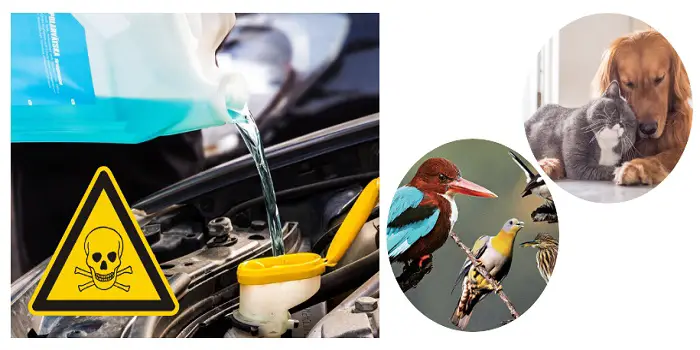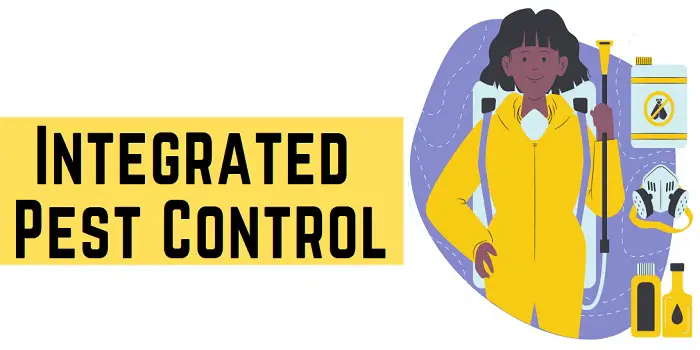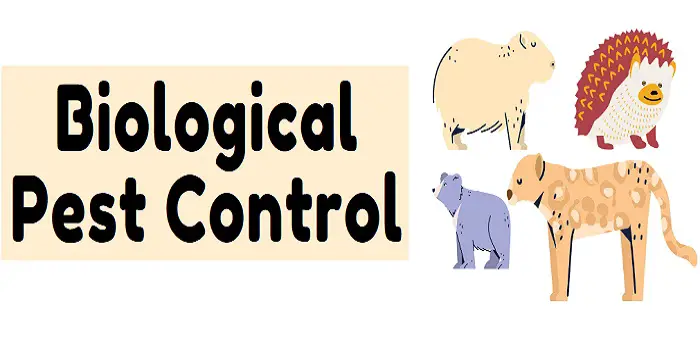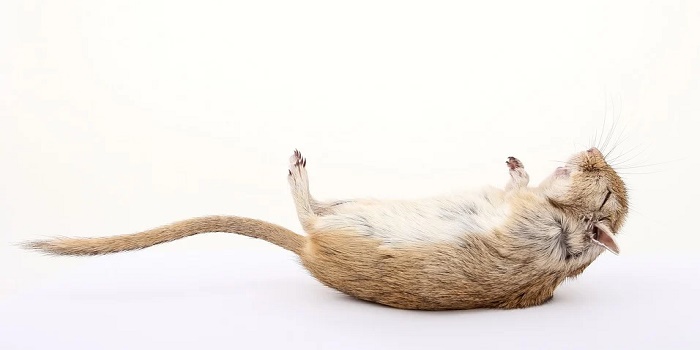
Antifreeze (or engine coolant) is a colored fluid used to regulate your car engine’s temperatures.
You simply add water to your antifreeze and create a mixture that helps in lowering the engine temperature when it reaches extreme levels while running.
Not only as an engine coolant, but it also helps maintain good fluid levels and prevent corrosion.
With that being said, Antifreeze contains ethylene glycol, which makes it highly toxic to birds as well as land animals.
This also means that when the stuff gets into the bird’s body, it can act as a poison, making them feel drowsy.
The reaction can be fatal and can cause involuntary muscle movements, watery droppings, difficulty in breathing, and even death.
How Does Antifreeze Poison Birds?
Ethylene glycol (CH₂OH)₂, which is used as the main ingredient in antifreeze, possesses a sweet taste.
Due to this, it attracts not only birds (like pigeons, starlings, etc.) but also the animals (like cats, dogs, mice, rats, squirrels, chipmunks, etc.).
When consumed by birds or animals, the organic compound is absorbed into the gastrointestinal tract, where it then metabolites break up into some toxic compounds, including glyceraldehyde, glycolic acid, glyoxalic acid, and oxalic acid.
These toxic compounds imbalance the body’s acid-base in birds and animals and can cause kidney damage.
Poisoning due to antifreeze will mainly make the birds drowsy and difficult to breathe.
How does it affect dogs and cats?
The antifreeze can be hazardous to other animals (like dogs and cats) irrespective of whether they ingest it directly or eat a dead bird that is already poisoned by antifreeze.
When talking about cats have a unique metabolism that can be affected drastically even with a teaspoon of antifreeze.
Antifreeze, when ingested by cats, may show symptoms that may include nausea, vomiting, depression, muscle tremors, jagged eye movements, frequent urination, etc.
This also means that your cat or dog can become seriously ill or can even die with such a little amount of poisonous antifreeze.
Many times, dogs may feel better after a few hours of antifreeze ingestion.
However, some of them may still get ill after a day or two as their kidneys begin to fail due to antifreeze poisoning.
Is All Antifreeze Poisonous in Nature?
Most water-based antifreeze we use for car maintenance contains chemicals like ethylene glycol, propylene glycol, and methanol.
While propylene glycol isn’t considered harmful in small amounts, ethylene glycol and methanol can be hazardous and poisonous if ingested.
Even if consumed in small amounts, antifreeze can poison the human body.
It can cause life-threatening complications and can prove to be fatal to birds and animals as well.
Using it with extreme causation is therefore recommended.
If you are concerned about the health of your family, pets, birds, or other animals around your property, using a non-toxic vegetable-based antifreeze can be a solution.
ECO2 is considered to be the most ecologically friendly antifreeze available, and it’s made with refined vegetable extracts that are non-toxic and biodegradable.
Plus, it is thermally more efficient than Propylene Glycol based coolants.
The Conclusion:
If you’re looking for ways to get rid of pest animals and birds from your property, then using antifreeze can be one of them.
However, remember that this easily accessible engine coolant can be poisonous for your pets and other beneficial birds you may want to keep around.
It can cause undesirable effects for them like kidney failure and, in the worst case, even death.
Hence, use these toxic engine cooling liquids with caution and, if possible, only for the purposes that it’s intended for.
Share the post "Is Antifreeze Poisonous to Birds and Animals?"

Welcome to ProShieldPest.com. I am Tina Jones. I have been working as a pest removal professional in Winslow, Arizona lately. At present, I love to spend my time with my family as a retiree.
Here I share all my knowledge and experiences to help people understand better how they can stop pests at their homes without actually killing them. Hopefully, the information you will find here will help in safeguarding your home! You can check more about me here.




